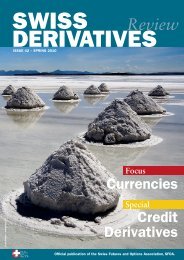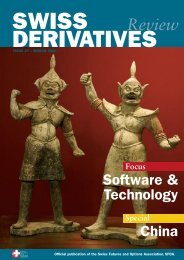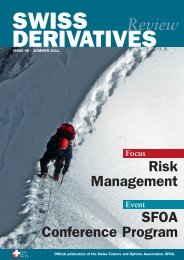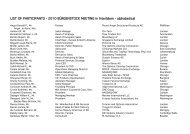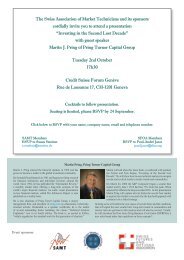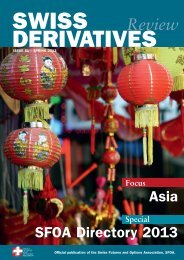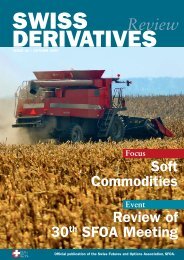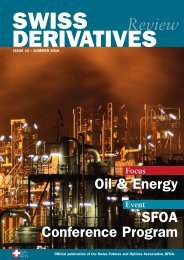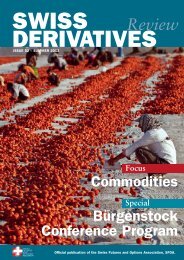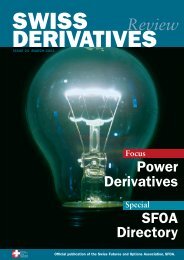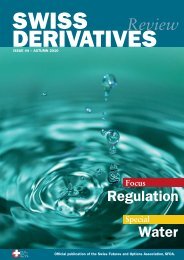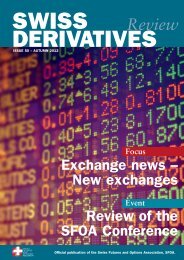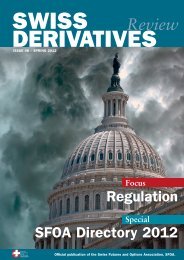Download PDF, Issue 26 - Swiss Futures and Options Association
Download PDF, Issue 26 - Swiss Futures and Options Association
Download PDF, Issue 26 - Swiss Futures and Options Association
Create successful ePaper yourself
Turn your PDF publications into a flip-book with our unique Google optimized e-Paper software.
“There’s no rule saying<br />
banks can’t offer<br />
structured products.”<br />
Focus<br />
which hedge the derivatives transactions<br />
they conduct with corporate customers<br />
by trading back-to-back with foreign<br />
bank counterparties. “I’d say even a year<br />
after we have the derivatives licence, Chinese<br />
financial institutions will still make<br />
up 95% of the total notional of swaps we<br />
do onshore,” says one derivatives head,<br />
at a global bank in Hong Kong.<br />
Derivatives as tools for profit<br />
However, in another significant change<br />
to the regulatory regime, financial institutions<br />
will be able to use derivatives as<br />
end-users to generate profit. Under the<br />
previous regime, derivatives could only<br />
be used for hedging <strong>and</strong> not speculative<br />
purposes, a rule imposed by the country’s<br />
central bank, the People’s Bank of China<br />
(PBOC), in 1995. What’s more, if a<br />
transaction was judged to be speculative,<br />
the validity of the contract could be<br />
called into question. That’s what happened<br />
following the collapse China’s<br />
Guangdong International Trust <strong>and</strong><br />
Investment Corporation (Gitic) in 1999,<br />
when a Chinese court ruled that several<br />
swaps transactions with foreign banks<br />
were speculative. The contracts were<br />
deemed invalid as a result, prompting<br />
some foreign banks to stop doing business<br />
with Chinese counterparties.<br />
The new regulations do not specifically<br />
repeal the 1995 PBOC Notice, <strong>and</strong><br />
several banks <strong>and</strong> law firms have queried<br />
this point with the CBRC over the last<br />
few months. “That’s been one of the<br />
questions the banks have been asking the<br />
CBRC: can you state the PBOC 1995<br />
Notice is no longer valid,” says one<br />
Hong Kong-based banker. “The official<br />
answer is that the CBRC cannot change<br />
the rules that other people make, but the<br />
regulations do say that where there is<br />
any discrepancy between the new rules<br />
<strong>and</strong> previous regulations, the new rules<br />
shall prevail. So that has given us some<br />
comfort.”<br />
However, while many of the uncertainties<br />
in the regulations have been clarified,<br />
there are still some aspects of the<br />
new regulations that are causing some<br />
confusion. For instance, while it’s clear<br />
that financial institutions are allowed to<br />
use derivatives for generating profit, does<br />
the ‘hedging only’ requirement still apply<br />
to Chinese corporates? The CBRC only<br />
regulates financial institutions, so makes<br />
no reference to whether corporates can<br />
use derivatives as a means to enhance<br />
yields on excess cash through the use of<br />
structured investment products.<br />
“It’s not dealt with in the rules. The<br />
rules only apply to financial institutions,”<br />
says Chin-Chong Liew, partner in<br />
the derivatives practice at law firm Allen<br />
& Overy, in Hong Kong. “There’s no<br />
single law that makes it clear, but looking<br />
at other laws <strong>and</strong> requirements <strong>and</strong><br />
underst<strong>and</strong>ing the regulatory framework,<br />
you come to that conclusion [that<br />
they can only use derivatives for hedging].”<br />
Self-regulation to fill the gap?<br />
Others, however, argue that there is some<br />
scope for the selling of structured products<br />
to corporates in deposit or note<br />
form, so long as banks are careful in<br />
their due diligence procedures, ensure the<br />
product is suitable for the firm <strong>and</strong><br />
appropriate authorisation is obtained<br />
from board members. “At least as far as<br />
the [derivatives] regulations are concerned,<br />
there’s no rules saying banks<br />
can’t [offer structured products to corporates],”<br />
comments another Hong Kong<br />
banker. “But we would look to do principal<br />
protected products, we would also<br />
look as to how big a percentage of the<br />
corporate’s capital is at risk, <strong>and</strong> we<br />
would look at whether the corporate had<br />
proper authorisation from senior management<br />
or even the board of directors.<br />
We would probably look on this to be<br />
self-regulatory as it is in Hong Kong or<br />
the US, rather than rely on a set of rules<br />
emerging.”<br />
The regulations themselves do set out<br />
a list of due diligence requirements for<br />
financial institutions conducting derivatives<br />
in China. Dealers must assess the<br />
suitability of their counterparties <strong>and</strong><br />
determine whether they underst<strong>and</strong> the<br />
risks <strong>and</strong> whether the transaction meets<br />
their business objective. The regulations<br />
state that dealers can to some extent rely<br />
on written documents provided by the<br />
counterparty in “good faith”. When it<br />
comes to corporates, the bank must disclose<br />
the risks <strong>and</strong> outline various scenarios<br />
that could lead to losses. They<br />
also need to obtain a letter of confirmation<br />
from clients stating that they are<br />
aware of the risks involved in the transaction.<br />
However, there has been some<br />
question over the level of detail required,<br />
what format the confirmation should<br />
take, <strong>and</strong> whether this information will<br />
be sufficient to prove customers were<br />
aware of the risks in a Chinese court.<br />
“I don’t think the regulators themselves<br />
have so far established what the<br />
criteria really mean, <strong>and</strong> ultimately it will<br />
be for a court to decide,” says Paget Dare<br />
Bryan, partner at law firm Clifford<br />
Chance, in Hong Kong. “Therefore playing<br />
it safe is going to be the best advice<br />
you can give to a client. Banks need to<br />
consider the risk warnings very seriously<br />
<strong>and</strong> apply them to the deal they are actually<br />
looking at, rather than the generic<br />
wording that they might be more used to<br />
using in interbank trades.”<br />
Questions also remain on the products<br />
banks are allowed to structure<br />
under the new regulations. While the<br />
rules themselves are very broad in their<br />
definition of derivatives, the CBRC states<br />
that a financial institution engaging in<br />
derivatives involving foreign exchange,<br />
stocks, commodities or exchange-traded<br />
derivatives must comply with other<br />
applicable regulations. As it st<strong>and</strong>s,<br />
banks are barred from conducting equity<br />
<strong>and</strong> commodity transactions, both regulated<br />
by the China Securities Regulatory<br />
15<br />
SWISS DERIVATIVES REVIEW <strong>26</strong> – NOVEMBER 2004



